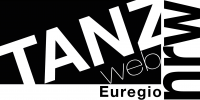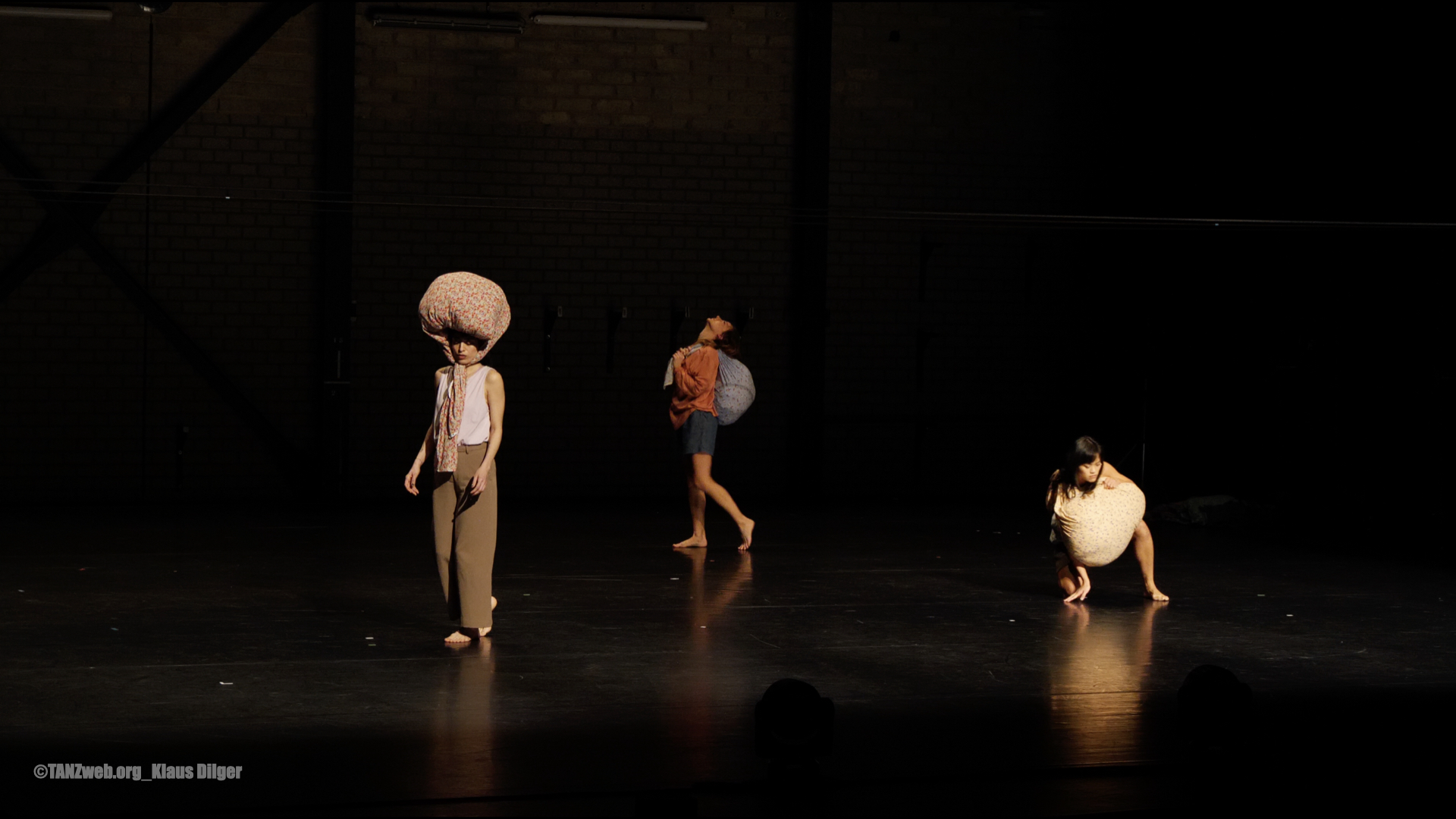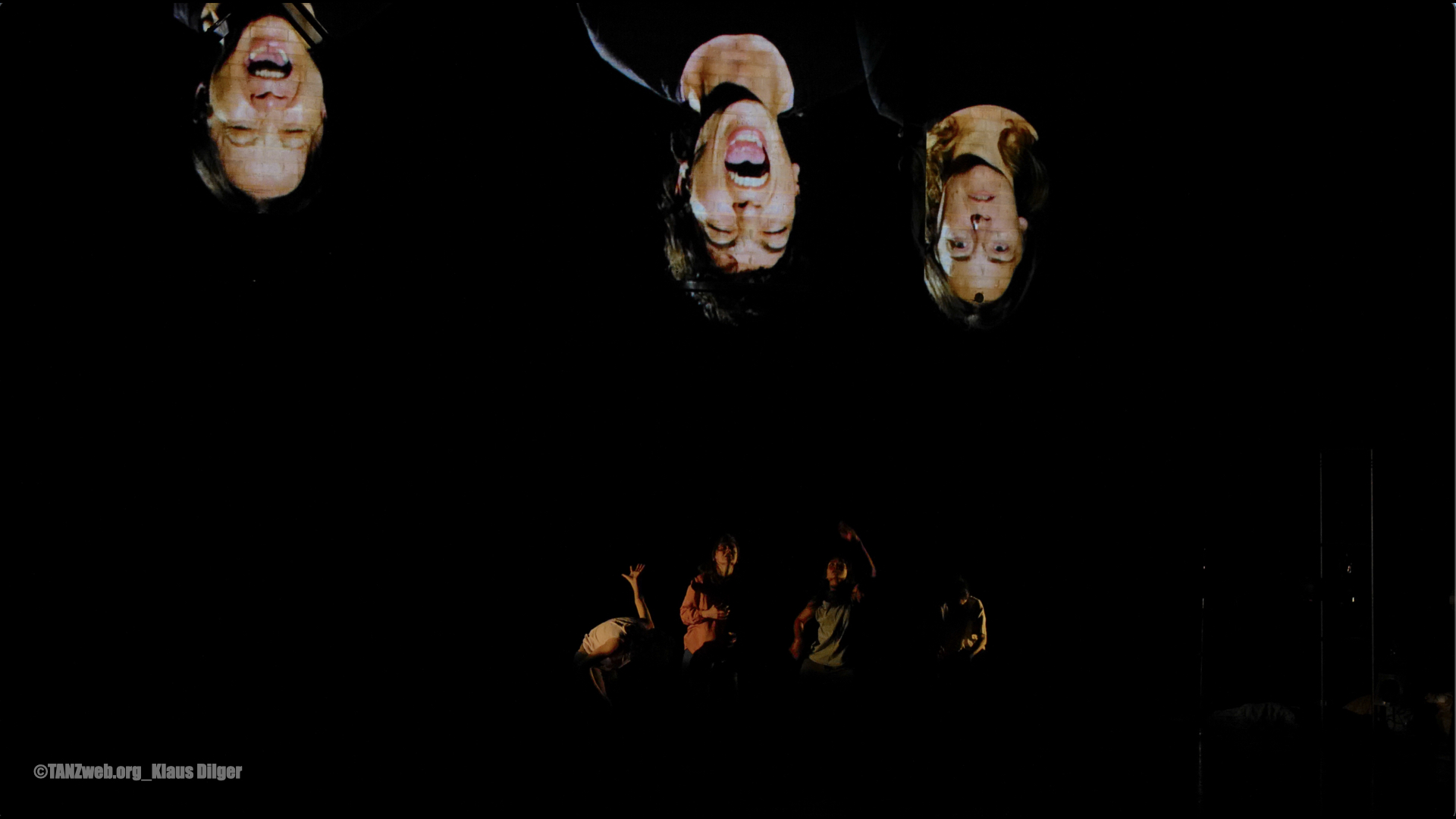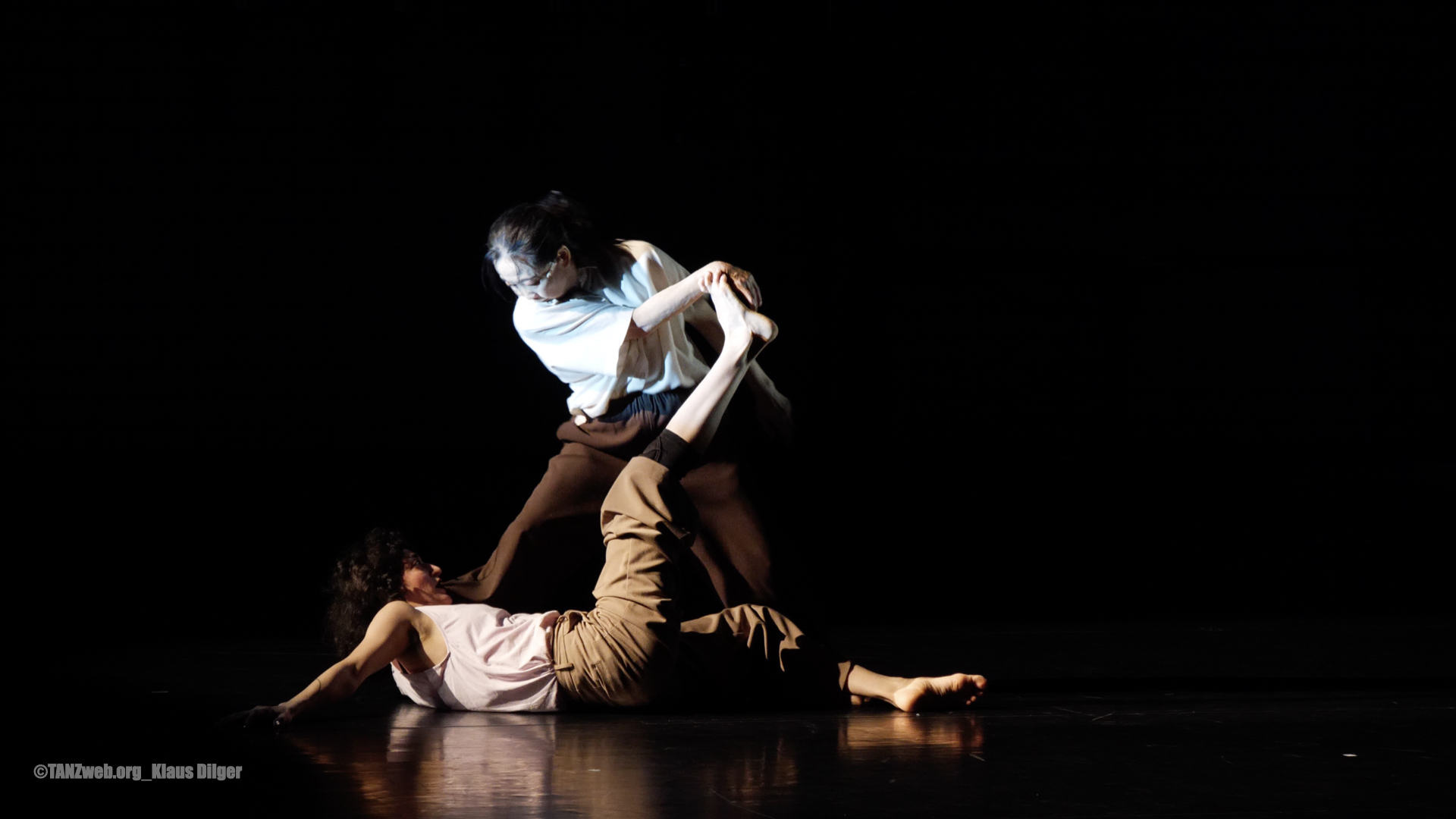schrit_tmacher justdance!
There are no mothers who were never daughters
But daughters who never become mothers. „New Report on Giving Birth“ by choreographer Wen Hui made a guest appearance at the Kerkrade Theatre as part of the Schrittmacher Festival
Night review by Melanie Suchy
How could a stage play about becoming and being a mother end? Perhaps there is no solution. This one is meagre, but wise: staged lapping up. In a film, it would probably be a fade-out. And if they haven’t died. Life goes on. So does the giving of life.
Starting such a biographically based piece is easier. In „New Report on Giving Birth“, the four protagonists, after the long silent entry and occupation of the stage, talk about being pregnant and giving birth (a strange old German word for giving birth) or about the decision not to have children. Divided equally between two of the women, dancers, each gets the floor. Each is different, each also has a different background, different parental and family history in the background. In the luggage on their backs. Or under the feet, above the head or „as a weight in the forearm“.
Wen Hui, the choreographer and director of the piece, one of the four, gives them space, sometimes organising them all as small groups, sometimes zooming in on one. Speaking, monologue or dialogue, has its time, and dancing has its time. The carrying and the throwing, the resting and the excitement.
They speak English, they talk about themselves. They mention their children, if any, and their parents, grandmothers, aunts, if necessary. A dancer colleague appears in one of the stories, a gynaecologist, a midwife, an anonymous „someone“, genderless. Sometimes the four of them or two of them speak in their mother tongues. It sounds and looks as if they understand each other when they are discussing or chatting happily. Chinese, Italian, Persian. Women’s language.
Voices
„We are family“ shouts the sign. The library, which is located on the ground floor of the theatre building in Kerkrade, has a special table with all kinds of novels. „Voetbal Vaders“, „De schoon moeder“ and so on. The documentary-dance piece ignores the „we“, the family. The men, the fathers-to-be. This is Wen Hui’s decision, and that helps the clarity of the many perspectives already presented in this not sensationally stirring piece. But it doesn’t want to be sensational either, it just wants to „report“. How are things going, how have you been? Sitting down together, talking about the past, the present, about joys and fears, listening to each other – that could be read as a quiet message.
Everyone carries their bundle:
Wen Hui turns the idiom into an image. Alessandra Corti, Patscharaporn Krüger-Distakul, Parvin Saljoughi and herself each carry a soft ball of cloth with them as they perform, even later. The way they hold it, on the crown of their head, on their shoulder, on their back, in front of their stomach, touching it gently, clutching it tightly, dangling it between their feet, later boxing on it, throwing it joyfully around them, all of this hints at individual stories of relationships. To whatever or whomever or to one’s own body, which harbours another when becoming a mother.
Unfolded, cloths and white blankets appear. A cloth becomes a picnic base for a meeting or an island for women. Blankets and cloths, hung over a wire line, become screens for projections of old photos, the blankets become bellyballs onto which portraits are thrown and crumpled (video: Rémi Crépeau), later becoming long skirts, the hem tips of which the four of them wave and flap violently like in Spanish dancing. There is talk of self-confidence at this point. At one point, a huge patchwork cloth covers almost the entire stage, becoming a world in yellow and orange, which one of the dancers at the back of the corner slowly pulls towards her and onto her lap. A reverse gush. A strange birth?
Perhaps a dream. Parvin Saljoughi excitedly reports that she dreamt that she had told her father about a dream in which she gave birth to a pig or was born by him. He, „a nomad all his life“, had once again not listened. She, the decidedly childless one, now squabbles with Wen Hui, pushing and shoving, until she stands over her and suddenly appears to be the mother of the one lying down. When both pull at the other’s trouser leg with their teeth and their bodies become entangled, the intergenerational clinch and the inner one are wonderfully captured. Holding and wanting freedom.
Leave me, hold me
What they usually dance is rarely so meaningful or too fast to decipher. The stretching, swaying, turning and foot tapping as if on a hot hob speaks of feelings and their own space. Sometimes the barefoot dancers appear angular, crooked and oppressed or prevented, sometimes they reach out loosely in all directions. Doing their thing.
Matthias Engelke’s electronic music creates atmospheres with its crackling, rattling and whispering, sometimes fast beats; it is a practical, not always pleasant companion.
My thing, „my decision“. Being able and allowed to decide for yourself about „giving birth“ is the performance’s louder message, which she also expresses towards the end. In addition, there are projections of women’s rights demonstrations, so small, on white bundles, that almost all that can be recognised is the turmoil. So the „Report“ makes a big deal of the four people performing here. We now know that the private sphere is also political. In this respect, the „report“ is successful because it recognises that it is not an all-encompassing view. It is not a scientific study. The statements he makes are perhaps no less valuable than the gaps you notice when watching and listening. Good art.
The choreographer
Wen Hui, born in 1960 in Yunnan, China, founder of the Living Dance Studio, which combined dance theatre with documentary film, was stranded in Germany in 2020 during the pandemic, where she had work to do and decided to stay for the time being due to the extreme restrictions in China at the time. She now lives in Frankfurt, where she has already taught and performed, for example with an impressive piece about the Cultural Revolution in China and how it was concealed there, „Memory“, which was created from research, i.e. conversations. In 1999, she became internationally recognised with her „Report on Giving Birth“; the one-child policy, which prevailed in China until 2016, affected and continues to affect women in particular. Wen Hui also created a „Report on Body“ and a „Report on 37.8“, which alluded to the policy of the first SARS epidemic in 2006, and wanted to revisit the topic of motherhood after a quarter of a century. When she began rehearsals with three fellow dancers from different cultural backgrounds – as she said at a press conference a few weeks before the premiere in Frankfurt last November – she didn’t know what the end result would be.
Team
Concept & Choreography: Wen Hui, Living Dance Studio / Dance & Performance: Alessandra Corti, Patscharaporn Distakul, Parvin Saljoughi, Wen Hui / Dramaturgy: Alexandra Hennig / Music: Matthias Engelke / Video: Rémi Crépeau / Lighting design: Matthias Rieker / Sound: Willi Bopp / Dramaturgical and research advice: Zhang Zhen / Production: Katja Armknecht / Operative production management: Nadine Branca / Outside Eye & Consultancy: Julia Alsdorf / Distribution: Damien Valette














